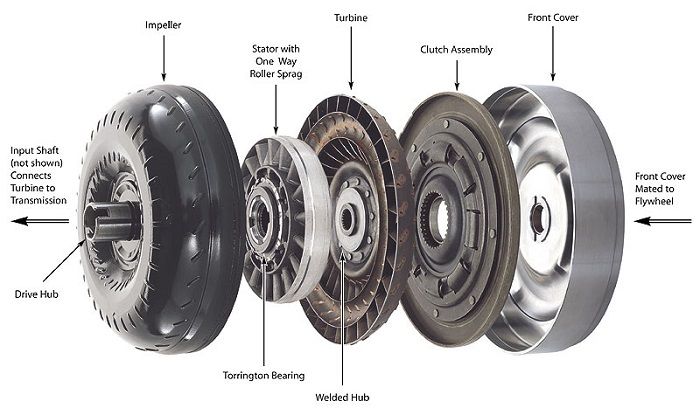
The torque converter is basically a part of your vehicle that controls the amount fluid is passed onto the automatic transmission as well as allows the engine to keep running on a complete pause.
In general, this element plays a very important part in the operation of the car, and if any problems happen it would possibly lead to unpredictable issue such as slipping and shuddering.

However, it is not so easy and simple to diagnose the accurate reason of problem in a torque converter. In fact, there are a lot of possible causes that would be lead to the malfunction. So in this article, we will show you some common issues in torque converter and its reasons.
Signs of Problem in Torque Converter
It could be hard to find out a problem with a torque converter, but there are a couple of common signs that you need to be aware of such as strange noises, high stall speed, dirty fluid, shuddering, slipping or overheating.
However, the torque converter would not be the reason in most situations, so do not rush to make any decisions until you have it checked out first.

- Overheating: If the temperature gauge seems to overheat, it would mean that the torque converter is not working correctly. In general, overheating is possibly the most common sign of problems in a torque converter because a drop in the fluid pressure would make the transmission to overheat. In fact, this would also be the sign of the malfunctioning solenoid or low levels of fluid, so remember to check it first.
- Transmission slipping: An issue of the torque converter will usually show itself quite rapidly since the fluid could not be controlled properly. If too much or not enough amount of fluid is passed onto the transmission, then it could make the gears to slip and you would usually feel the loss in acceleration. In addition, you would also see a sudden decrease in the fuel economy of the car. Ineffective or low fluid could also be the reason, so you have to examine the fluid if any slipping happen.
- Shuddering: If your car start to shudder at the speed from 30 to 45 miles per hour, it would mean that a torque converter is happening. In fact, it would usually feel like going over a bump or rough road and you would certainly notice if it occurs.
- Dirty fluid: After checking the fluid, if there are a lot of black substance, it would either mean that your torque converter or transmission are damaged. In this situation, you need to change a fluid first, then start the vehicle for a short time, and check it again.
- High stall speed: A malfunctioning torque converter would take a transmission more time to engage your engine, leading to greater than usual stall speed. You could do test for stall speed to find out any problems in the torque converter, but you would have to understand the torque converter and the specifications of the engine’s stall speed first.
- Strange noises: Any foreign noises such as revving or clicking sounds would indicate a problem in the torque converter.
How to Find Out The Problems in Torque Converter?
This simple and easy test could help to diagnose possible issues with a torque converter. In general, what you would need to do is starting the vehicle while seating in the seat of driver and allow it to idle for a moment.
After that, step on the gas gently a couple times, allow it to idle again, press the brakes down, and then turn into drive.
Throughout this process, you would try to find out any strange noises such as revving or clicking.
If not, continue to shift for all the gears, including reverse and attempt to look for some of the mentioned signs again.
Lastly, drive the vehicle and check for the same elements as well as slipping or shuddering.

Common Reasons for Problems in Torque Converter
There are a couple of possible cause for problems in a torque converter. Therefore, do not assume what the issues would be until you take a look at the transmission. Below are several general causes that you could find:
- Broken needle bearings: This is basically a common issue that you would see. In general, needle bearings are the elements that separate the converter housing, turbine, impeller and stator. If they are damaged, it would make the transmission to produce strange sounds while you are driving. It is mainly because there is contact between metal elements in the torque converter, which would in turn generate metal chips that are picked up by the transmission fluid and cycle around the transmission.
- Damaged seals of torque converter: A broken seal of torque converter would make the fluid to leak out of the torque converter, which would lead to a couple of issues such as shifting, slippage and overheating. Thus, the seal would need to be checked and changed.
- Damaged clutches of torque converter: Just as the manual transmission, the automatic model is also made with clutch even though they are placed in most part of a torque converter assembly as well as the transmission. A damage clutch of torque converter would happen when it burn due to high heat temperature or it gets stuck from locking up because of distortion. In addition, they could even crack under severe cases. If the clutches get jammed, your vehicle would stay in the gear even when you stop it completely.
Leave a Reply